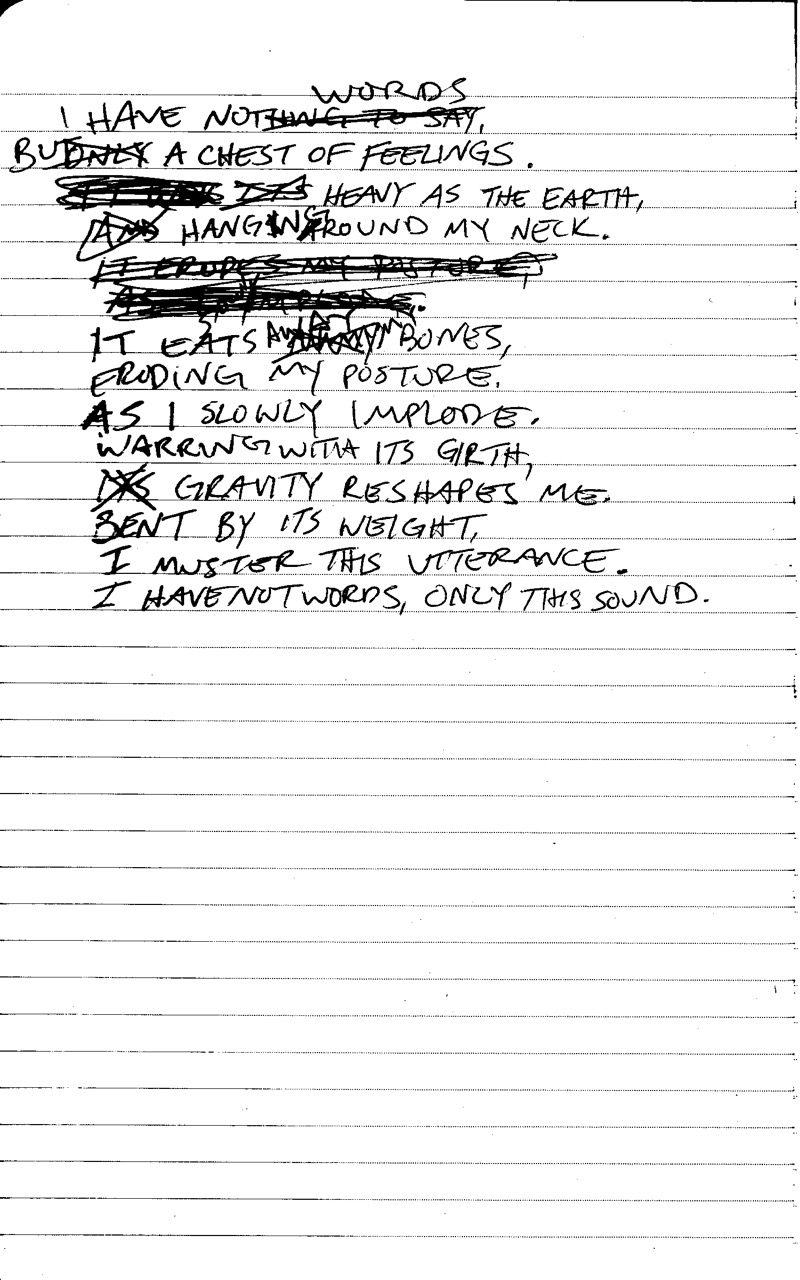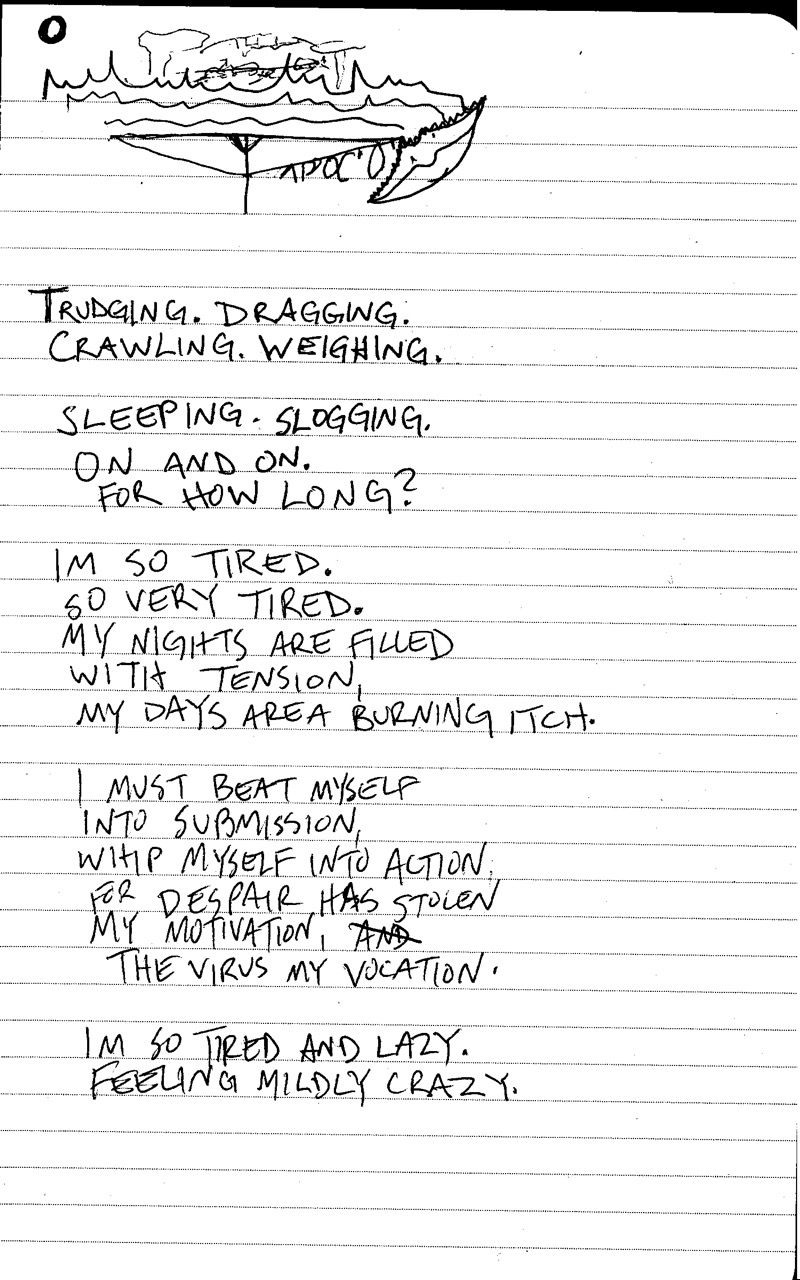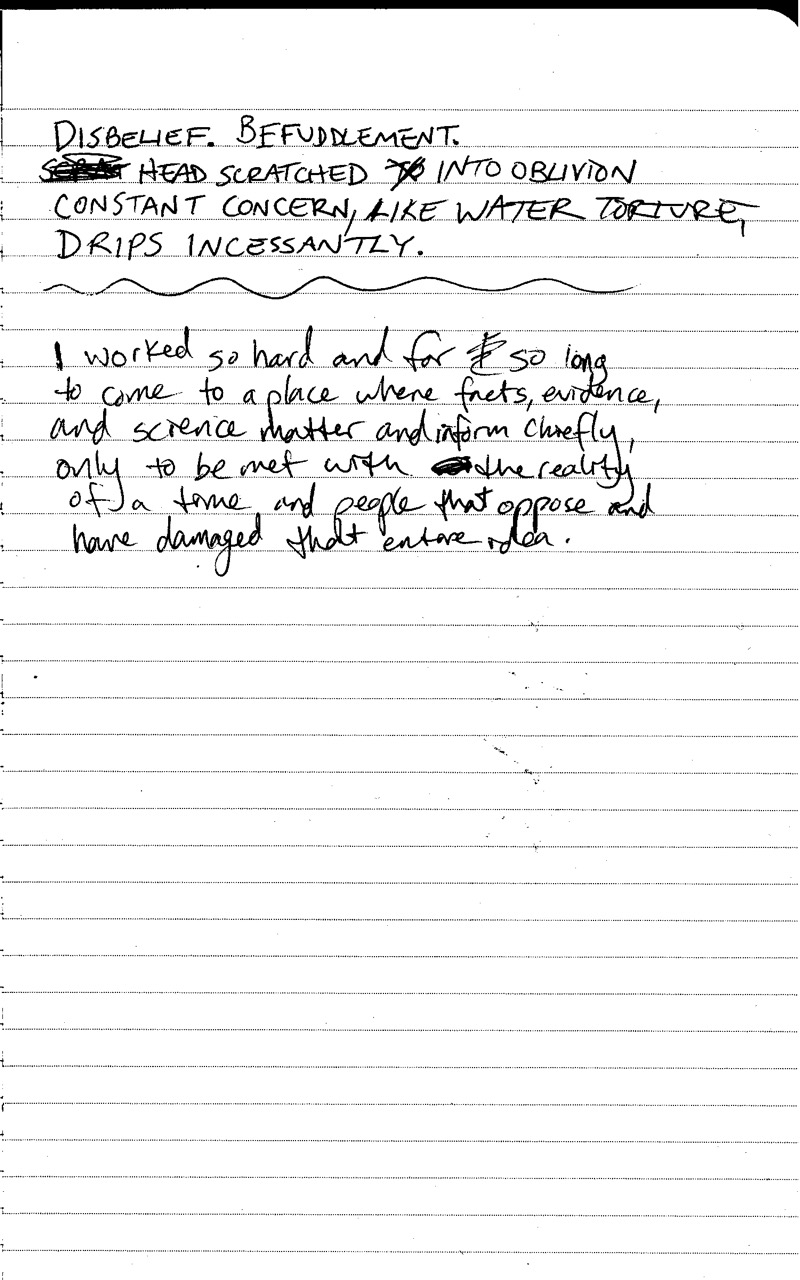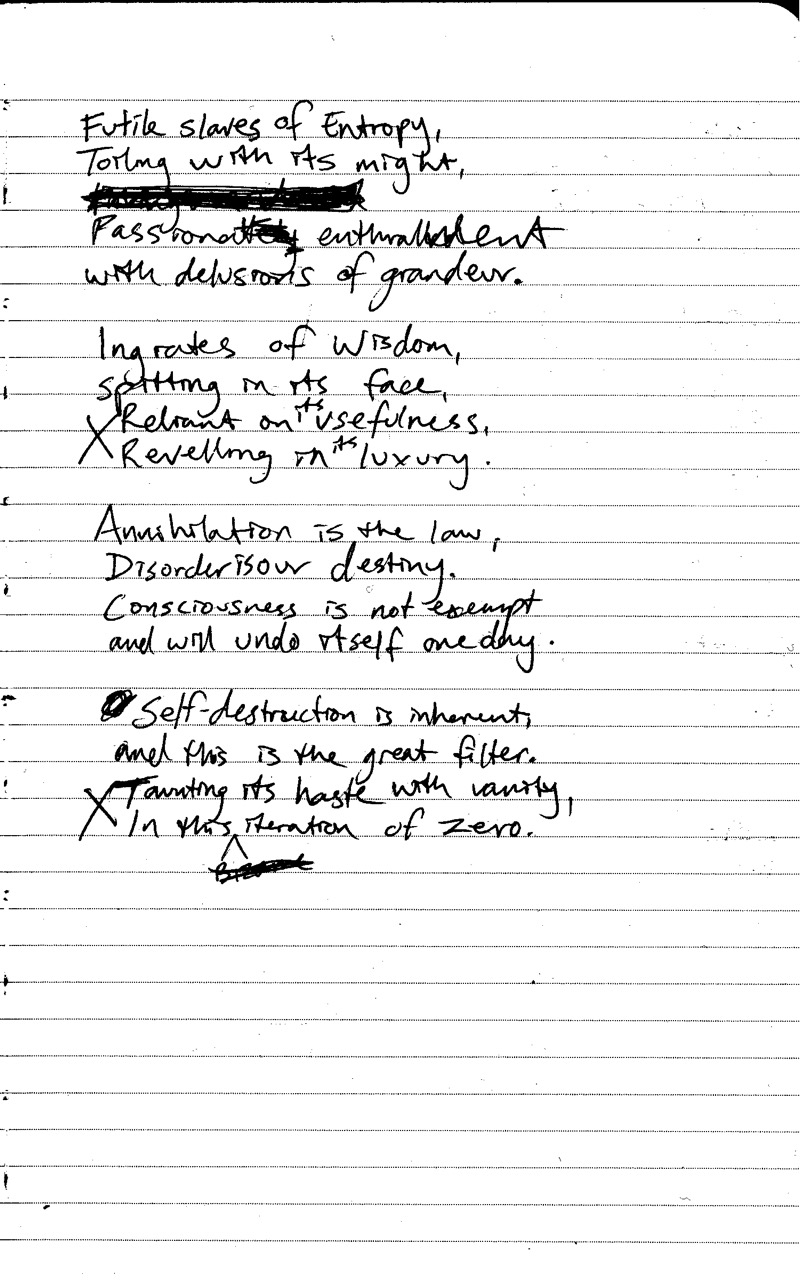"I hope that there’s some food for thought in the words that can be immediately discerned and that it will speak to the moment for some people and maybe help others feel a little relief over similar frustrations that they have."
If there’s one writer that can get the best out of their interviewee it’s Cody F. Davis. We knew that there would be no-one better to dive into the brand new Mizmor track that we’re premiering later this weekend. It’s a long read, because that’s what Cody does best, and Mizmor’s A.L.N. has a lot to tell… so grab yourself a cuppa (or something stronger, we don’t judge) and immerse yourself in the inner workings of Wit’s End.
The world has greatly changed since the last time you and I spoke about your music. How has creating and crafting Mizmor’s music changed in isolation compared to when you were writing and recording Cairn?
A.L.N.: “That’s a good question. One thing that’s changed is I have collaborated with another artist. Andrew Black and I released a record called Dialetheia in November that was done through file-sharing, which was a whole new process for me – both the collaboration aspect in general, and recording and writing an album while apart.
“I’ve done that and I kind of have some sketches with another collaborator doing the same thing right now. I’ve also done more of my traditional style where I’ve just done everything myself. Being isolated at the house isn’t too different from what I was already doing. This piece, Wit’s End, is a piece that I’ve also made during this time just at home by myself.
“But I have been influenced thematically by the pandemic and people’s reaction to it. That has been a thought-provoking thing for me to reflect on. It’s been inspiring, I suppose.”
It gives you some different source material to work from in addition to the collaboration that you’ve done with Andrew already. How does either the collaboration with Andrew and what you’re working on presently, as well as your response to the pandemic, influence this new track Wit’s End.
A.L.N.: “Wit’s End is conceptual but not quite as singularly focused as Cairn was. There are a few things worked into it. But as far as the pandemic’s influence on it, I’ve been inspired by—I mean, it’s the pandemic but it’s also just kind of society at large right now and where we’re headed as a people. I’ve been inspired by, at large, how eager and willing the masses are to embrace misinformation, disinformation, cultism, conspiracy theories, and religiosity.
“A sense of there being a vetting process for determining facts—what is true and false—has completely split in two. I feel like everyone around me is at wit’s end in this sense. There’s no reason anymore in people’s brains and how or what they determine to be true. Just seeing how, at least in America, everyone has reacted to the pandemic, has kind of got me scratching my head.”
Very much so. Seeing how the last year is really unfolded has been very eye-opening, to say the least. It really is quite interesting to see, like you mentioned, how people are latching onto whatever truth they want to manifest.
How do these observations and your vision of what’s going on with pandemic apply to the Fermi Paradox and this idea of The Great Filter, which you also have mentioned is a source for Wit’s End?
A.L.N.: “They both, to me, relate to consciousness, which is kind of the broad theme of what the song is about. It essentially states with what we know about life and processes through the science of the Earth and the universe, the galaxies should be populated, and life should be everywhere.
“There’s a rift between that and there being any substantial evidence that we have already made contact with alien life. I know lots of people believe that we have, but canonically speaking in terms of good, solid evidence, we need to explain why we haven’t already come into contact with extraterrestrials since life should be everywhere.
“The Great Filter is the answer to that paradox. It says, ‘if what’s happening on this planet is happening everywhere in the universe, then something in that process must be difficult.
“Whether that’s abiogenesis—the initial formation of life—or the evolution of that life into a more complex, multicellular life then on to conscious, intelligent beings, and then having enough resources to make it off the planet to another planet. There’s a list of processes that would happen for that to take place and people theorize as to what is the unlikely thing.
“My own take on it, in sort of the science-fiction sense, is I think The Great Filter is consciousness. Not that it is hard for beings to become aware and conscious, but that consciousness has certain self-destructive inherent properties to it that would essentially cause the life-form to self-destruct due to their self-interest before ever being able to make it off the planet.
“That is definitely the biggest inspiration for Wit’s End. Consciousness is not some ethereal, eternal, metaphysical, or otherwise special and unique property. It’s ultimately just a product of physics and biochemistry and it will, like everything else, unravel one day as the universe continues to expand and comes to an end way, way, way, way far in the future.
“It’s kind of a reaction to so many religions and worldviews really having this grandiose idea of mankind and the spirit and the soul and that kind of language. I just think none of that stuff is real at all.
“I don’t know that it directly relates to what we were talking about before, but I see some crossover with where we’re headed as a people and where our own consciousness has got us and how it seems like we would rather believe in things that make us feel good than things that are true. We would rather reject the evidence of climate change for example, and we’re probably headed to a place where our planet can’t sustain us anymore and that would be our fault. That’s what could be the pattern for intelligent conscious life elsewhere in the universe.”
You mentioned climate change, and you can even look at it on an individual level with some of the ways people are handling the pandemic. There’s this almost grandiose view, this self-exception to the world around them. They think, “Oh, this doesn’t apply to me…”
But I think a lot of people do forget we are ultimately matter – we’re mass. We’re subjected to entropy and the laws of thermodynamics. With the pandemic and seeing this acceptance of false information or occultism or religion, do you think it’s a product of people grappling with mortality, or are we seeing people’s distinct lack of rationality in full frame because of this?
A.L.N.: “It’s hard to say. I think at a base level, if we look back in time, superstition starts with people grappling with mortality. That’s a huge part of it, but for this moment in time, I think that the internet and social media have really accelerated this problem of, ‘I see something and it’s automatically true. It fits with my narrative in my echo chamber, and I want it to be true. I choose to believe it.
“We’re all living in a fractured reality in that sense. It’s really disappointing to see the scientific method and such a thing as facts become a matter of opinion or subjectivity. I think it’s probably always been there under the surface, but it seems to be really exacerbated by how immediately connected we all are with sharing our ideas. I just see us as getting a lot stupider, for lack of a better word, with technology and all of these ideas at our fingertips.
“If you’re already a person that is religious or involved in a cult or just has that frame of mind that would put you in one of those groups already—a faith-based person—then they sky’s the limit of what you’ll believe.”
That’s a great point. Systems like religions and cults already have a distinct lack of emphasis on solid research and strong evidence so all it takes is a cousin on Facebook or their pastor at church to say, “COVID is the work of Satan or people in Asia…”
This can kind of tie back into the Fermi Paradox as well, right? There is a distinct lack of evidence for extraterrestrial beings as it pertains to the Fermi Paradox. It mirrors the lack of evidence as it pertains to other things despite people’s willful claims for other beliefs. Is this the kind of connection that you’re trying to make with these two ideas?
A.L.N.: “Kind of. There’s definitely a parallel there. I think more the connection is that I see people’s inability to use basic reason and logic and value strong evidence as being something that’s going to help us self-destruct faster.
“It starts with consciousness which seems inherently self-interested. We come online and become aware of this user interface that is ultimately a survival machine, then we become cognizant of it all and it seems to go in this direction to aid us in our own survival. As it continues on, we get more memes stuffed in our brain, develop language, and more intelligence and technology. Instead of us coming to a more enlightened position about our place in the country, the Earth, and the cosmos, it seems to bring us to the opposite—into a more fractured xenophobic tribalistic superstitious place.
“I don’t know if there’s any real link there. It’s kind of science-fictiony, but it’s just my reflection on where we’re headed.
“I think it’s probably not hard for life to start on a planet and if there were something to be getting in the way of making contact with life on another planet, it would just be ourselves. Which I relate to consciousness. Whether it’s because there’s a lack of resources because we mined them all for ourselves or whether it’s us killing each other in a war, there just seems to be something self-destructive about where consciousness goes.”
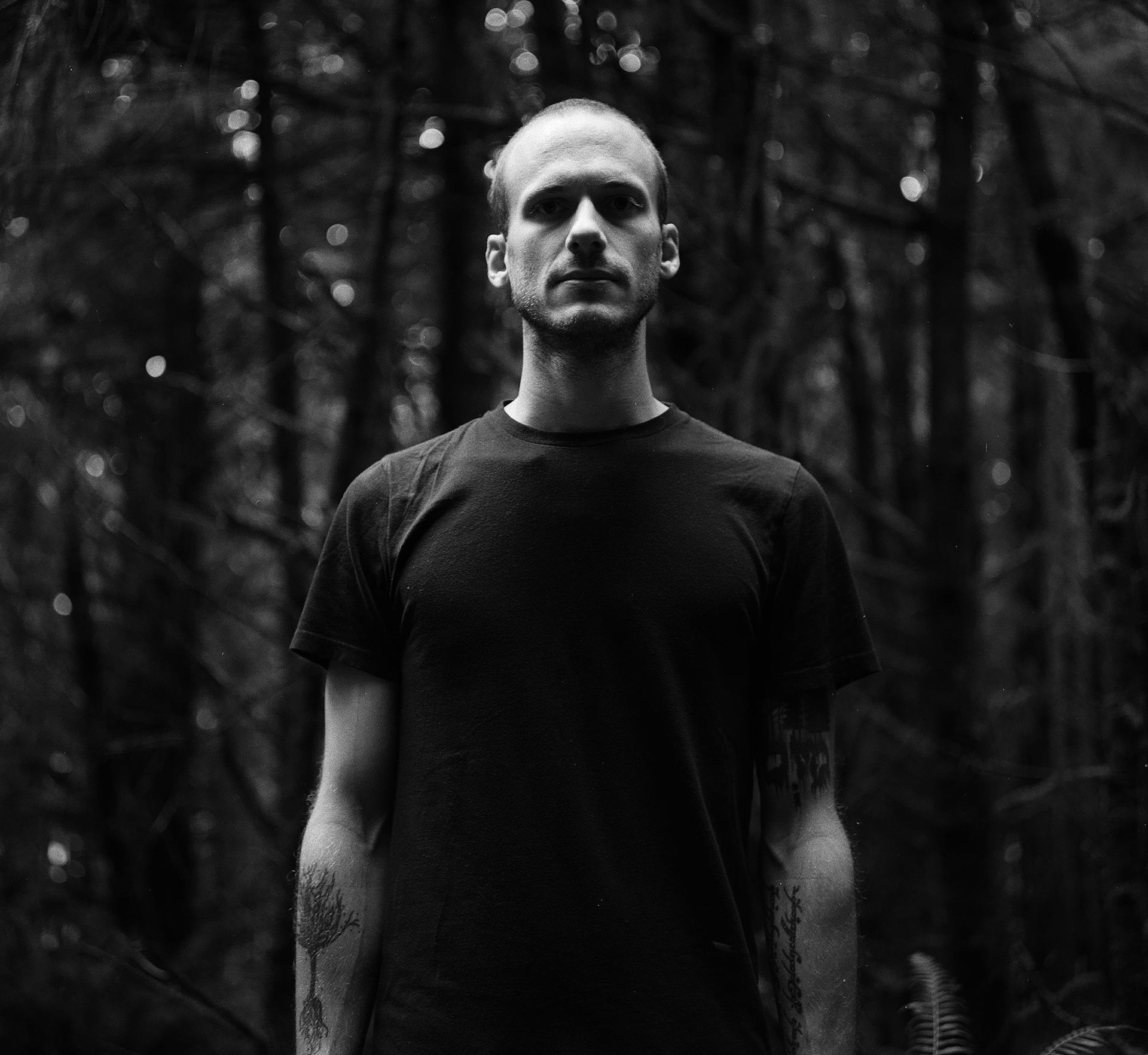
Shifting to the track itself and keeping in mind that idea of consciousness, Wit’s End opens with a spoken-word sample over some clean guitar chords. It encapsulates the message that you’re delivering with this song. Where does the sample at the beginning of the track come from, and how do you think it bolsters the impact of Wit’s End?
A.L.N.: “Well, the sample is actually me. I tried really hard to produce it in such a way that it sounded like a sample. I feel like the spoken part is really speaking to my frustration of watching people’s reaction to the pandemic and embracing conspiracy theories; having myself come from the greater part of a 10 year journey away from that kind of mindset to a place that values science, reason, and evidence that is ultimately atheistic.
“It’s been such a long journey that I finally got to the other side of, and then I look around and a large part of the population is totally going in the other direction. Maybe this is just a little setback on the otherwise upward trajectory of our morality as a species. But right now, it’s just really upsetting that so many other people don’t share these values that I’ve worked so hard to cultivate.
“o, that first part is just kind of my emotional reaction to people and faith. The second part, the heavier part with all the screaming, those lyrics are more about the cosmic stuff.”
What were your goals to marry your thematic ideas to your arrangements? What were you hoping to encapsulate with the musical side of it?
A.L.N.: “It’s kind of multifaceted with the Wit’s End theme. In one sense, it’s about consciousness cosmically coming to an end. In another sense, it’s about the masses becoming stupider and stupider, and in a third sense, it’s about me reacting to the masses and myself not being able to comprehend what’s going on.
“That third thing is where I’m emotionally writing from—me being at wit’s end. Watching people have no reason and logic anymore all in this system that eventually will come to nothingness anyway. It’s kind of three layers of wits ending. I just felt this depressing weight of the world and people’s reaction to, say, the pandemic, but really that’s just a catalyst for some of this stuff.
“I just feel so exasperated, exhausted, and disappointed by where we’re at as a country and a planet. Musically, the first part with the clean guitars and the spoken word is building tension. The heavy part is just releasing those negative emotions.”
So how does Wit’s End fit into the trajectory of Mizmor? You’ve previously mentioned following Cairn, new music subject matter may begin to take a different approach than it has historically. Is this a turning point for where you’re going to take some of your music going forward?
A.L.N.: “I think so. I think a big difference between Wit’s End and Cairn is that although I’m still writing from my perspective and reflecting on things and feeling emotional, I’m not writing about myself right now and my experience which is what Mizmor has been about up until this point. My emotions and thoughts as I struggle with my worldview and ideology changing. I said that to you in that interview about Cairn because I thought that album had a lot of finality to it, and I felt a lot of healing. I came to this place where I didn’t really need to explore that anymore.
“So now what I’m finding, thinking about, and feeling about are bigger issues. Writing about things that affect all of humanity—it’s still kind of centered around religion and I doubt that I’ll ever fully escape that—but it’s not this “me, me, me” thing anymore. Now, I’m just reflecting on what seems like bigger things that still affect me and inspire me, but I don’t really have the personal work to do anymore that I was previously expressing on those other albums.
“Another thing is the collaboration with Andrew, Dialetheia, even though that didn’t have lyrics, we still conceptualised on what it was about with each other. That was also kind of about consciousness and reacting to the pandemic, feeling really nostalgic and sad. I think I’m kind of a little bit fascinated by consciousness and that could also be a topic that I continue to explore.”
For Cairn, you referenced Camus and The Myth of Sisyphus a lot. Is there any reading or material that you’ve been looking into that’s directed towards consciousness?
A.L.N.: “Yeah, definitely. Nothing that directly inspired the music like with Cairn, but I read this book called Consciousness Explained by Daniel Dennett. That book was from the 90s. He’s a philosopher, but he draws heavily on science—physics, chemistry, biology, the whole thing. It sets out to explain the phenomenon of consciousness from a materialist point of view and dispel the myth of the Cartesian theater—the ghost in the machine, the sort of leftover idea of the soul or the immaterial self that sits inside your head and thinks your thoughts and feels your emotions. That’s all really an illusion.
“So, I read a few books like that. There is another one he wrote called From Bacteria to Bach and Back: The Evolution of Minds. Waking Up by Sam Harris is a very good book that is about consciousness and also mainly about meditation.”
What are you hoping listeners and attendees of Roadburn Redux will take away from Wit’s End?
A.L.N.: “I’m hoping that honestly they just think it’s heavy. The spoken lyrics in the first part are more intelligible than the screaming typically is for people. So, I hope that there’s some food for thought in the words that can be immediately discerned and that it will speak to the moment for some people and maybe help others feel a little relief over similar frustrations that they have.”
Is there anyone or any performance that you’re looking forward to during Roadburn? Anything on your radar?
A.L.N.: “Yeah, I’ve seen that Primitive Man is also premiering some new music and I’m really looking forward to hearing that. I’ll probably watch a handful of things but I myself and not huge into the live set livestream which is why I’m doing this approach myself. So, I’m definitely excited to see the Primitive Man premiere and I think that’ll be fun to hear.”
Down below are the raw ideas that would become the lyrics of the song, scrawled over the course of a few months whilst inspiration was brewing.
